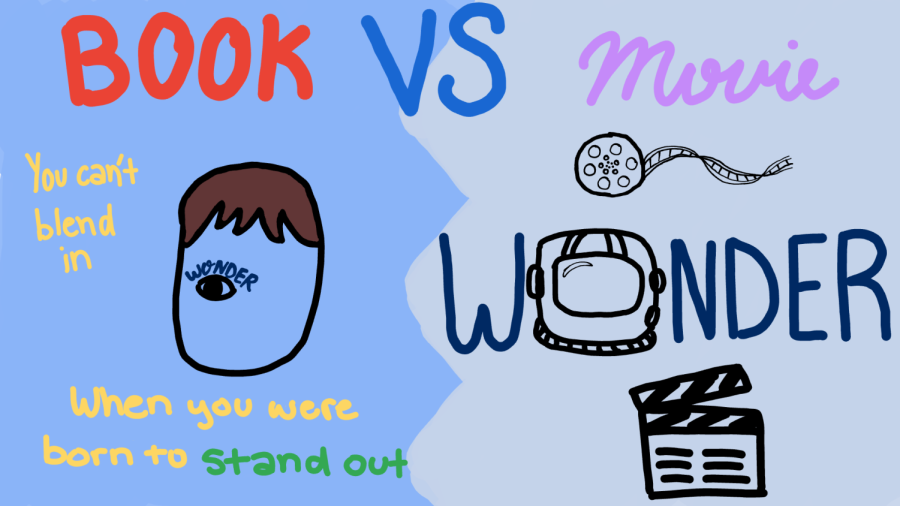“Wonder”: Book vs. Movie
April 2, 2022
Wonder is a novel that was published in 2012, and written by R.J. Palacio. Though it is a book told from multiple perspectives, each perspective ultimately connects to the story of August “Auggie” Pullman, a fifth grader with a facial deformity who must adapt to a new school environment at Beecher Prep. This constant switching of storytellers expertly contributes to the novel’s main focuses of perseverance, self-consciousness, and social acceptance. In 2017, the novel received a movie adaptation and was rated at an impressive 88% on Rotten Tomatoes for its masterful depiction of the varying emotions that each of the different characters experience. Though there are some discrepancies between the novel and its movie adaptation, the two are generally in sync with each other in terms of plot progression and character development.
One of the best ways that the film parallels the novel is its powerful display of the characters’ emotions. From the constant anger and discomfort he feels at school for all the states he receives and talk behind his back that he hears to the support he gets from his older sister Via, his parents, and the handful of classmates and friends who won’t put physical differences in the way of creating friendship, the story of Auggie Pullman is written as a heartbreaking tale turned heartwarming and it retains those same sentiments in the film. In addition, the film effectively recreates the feelings of the other characters, notably the anger yet understanding that those around Auggie feel about why people view him in the disapproving manner that they do. In both the movie and the film, Via is displayed as being angry at herself for feeling embarrassed of others knowing she is Auggie’s sister. Her boyfriend Justin, her friend Miranda, and Auggie’s friends Summer and Jack, also share feelings of sympathy for Auggie and his terrible situation that he had no choice over.
However, one of the ways that the novel will always be superior over the film is its ability to open the imagination of the audience. In the film, Auggie has a set visual representation of the deformities of his face. As such, it limits what the audience imagines Auggie looks like to just one face. By comparison, the detailed yet open description of Auggie’s physical appearance allows the audience to create their own unique picture of Auggie. Though the film does well in portraying what happens in the novel, that in itself is a unique interpretation of the story of Auggie Pullman and the people around him. The film provides one way of understanding the story of Wonder that may not be in line with how others may have.
Furthermore, the film omits some components of the novel that are crucial to developing the plot. One such omission is the significance Summer, one of the few people at Beecher Prep who truly feels sorry for Auggie and decides to sit with him and become his friend. In the novel, she is one of the first people at the school that Auggie meets, alongside Jack and Julian, who the audience later learns is the ringleader of the bullying against Auggie. As such, Summer is there with Auggie from the very beginning and remains there until the end of the novel. In the film, she only sits with Auggie after Jack chooses to no longer hang out with him due to peer pressure. This diminishes the role that Summer plays in the original novel, and takes away some of the depth of her connection with Auggie.
Another major plot point that is left out in the movie is the story of Auggie’s hearing aids. In the novel, Auggie is originally opposed to having hearing aids because he feels that they will make him look even uglier than he already is, as well as holding a sense of denial that his hearing is in a better condition than it actually is. Eventually, he realizes that he needs them after failing a hearing test, and afterwards has no issue with wearing them. Sadly, his hearing aids are also one of the things that the bullies at Beecher Prep cause him to lose. In the end, this entire part of the storyline was not present in the film.
“The book had much more time to flesh out the characters and did a really good job of explaining the story through the different perspectives,” said junior Tin Nguyen. “The movie attempted to do the same but was too condensed and felt like it was trying too hard to get to all the important plot points. However, the emotional impact of the important scenes was a lot more profound.”
Ultimately, while Wonder’s movie adaptation had many strengths, it made some sacrifices in important parts of the original plot for the sake of fitting a certain screen time. In addition, its existence in itself causes it to fall short of the unparalleled imagination that the novel allowed its audience to have. Nevertheless, the film is a wonderful retelling of the novel’s events and brings to life the story of Auggie Pullman and his story’s message that being someone who stands out isn’t always a bad thing.

